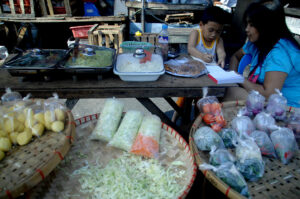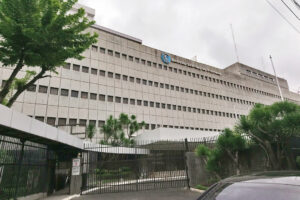No reason to be complacent: Helping the illiterate

(Part 3)
In his Message for the 2023 World Day of the Poor celebrated on Nov. 19, 2023, Pope Francis recalled the 60th anniversary of the encyclical Pacem in Terris of Pope Saint John XXIII by quoting the following from the encyclical: “Every human being enjoys the right to life, to bodily integrity and to the means necessary for the proper development of life, including food, clothing, shelter, medical care, rest, and, finally the necessary social services. In consequence, every individual has the right to be looked after in the event of ill health; disability stemming from work; widowhood and forced unemployment; as well as in other cases when, through no fault of his own, he or she is deprived of the means of livelihood.”
From these words of Pope Francis, we should be careful not to pooh-pooh “dole-outs” citing the well-known phrase “it is better to teach someone to fish than to give him fish.” Even Our Lord had to perform a miracle to give instant relief to thousands of hungry people by providing them some fish (and bread) to eat. There are many situations in which immediate relief is needed. In many of the cases, it should be the Government (through the Department of Social Welfare and Development or DSWD) who should decide who are the ones entitled to instant relief such as in the cases of cash gifts through the 4Ps (Pantawid Pamilyang Pilipino Program) itinerant program. This is the reason why the DSWD recently admonished private individuals to refrain from giving street beggars the usual cash gifts because such direct help may just encourage dependency even among those who are healthy enough to do some productive work. Let the DSWD decide who are the really deserving poor. For the others, the most effective help is to provide them with the necessary knowledge and skills to be productively employed.
It is heartening to see many business organizations like the SM group, the Metrobank group, the Madrigals, the Aboitizes, the Ayalas, and the Lucio Tan group and many others organizing educational foundations supporting the school-related expenses of numerous deserving but poor young people so that they can acquire quality education in some of the leading private educational institutions. These scholarship programs go a long way to uplift the lives of many poor households. Also very commendable are individuals or organizations that help establish skills training institutions like the Don Bosco Technical Schools, the Dualtech School, the MIF Institute of Technology (formerly the Meralco Foundation), the Center for Industrial Technology and Enterprise (CITE) in Cebu, and other Technical Educational and Skills Development Authority (TESDA)-certified technical training institutes that produce technically qualified people that are in great demand in the business sector.
In fact, Senator Sherwin Gatchalian recently called out TESDA for supposedly pushing training programs that do not align with today’s most-in-demand jobs. In his statement, the Senator lamented that TESDA’s programs with the highest enrollment do not align with the most in-demand jobs until 2025. It seems that none of the top five most popular courses offered by TESDA are aligned with industries that will grow in the next three to five years. It is important then for the big private donors supporting scholars to make sure that their beneficiaries are actually enrolled in the right courses. The right technical or vocational schools turning out people with skills needed by industry are even more needed than the run-of-the mill colleges or universities that often turn out college graduates who have no skills that are marketable. Often, there is a big mismatch between what is demanded by industry and the products of college degree programs. We have to re-examine the K-to-10 as well as the K-to-12 programs so that, as President Ferdinand Marcos, Jr. announced in his second state of the nation address, we can encourage more of our high school students to follow the tech-voc track and acquire more relevant technical skills (e.g., in the construction and hospitality sectors) instead of aspiring for a college degree that leads to nowhere.
But what do we do with the numerous poor who are illiterate and cannot qualify for formal education, whether college-oriented or tech-voc? The most recent data reveal that there are 363,683 illiterate youth in the Philippines and 2.8 million illiterate adults. Nine out of 10 Filipino children struggle with reading at the age of 10. The first solution is obviously to address the problem of Filipino children who have difficulties reading. This is where the Department of Education, i.e., the Government, has the primary responsibility of addressing this serious problem.
Let us quote Pope Francis again: “How much still needs to be done for this to become a reality, not least through a serious and effective commitment on the part of political leaders and legislators! For all the limitations and at times the failures of politics in discerning and serving the common good, may the spirit of solidarity and subsidiarity continue to grow among citizens who believe in the value of voluntary commitment to serving the poor. Certainly there is need to urge and even pressure public institutions to perform their duties properly, yet it is of no use to wait passively to receive everything ‘from on high.’ Those living in poverty must also be involved and accompanied in a process of change and responsibility.”
There are numerous individuals, both young and old, who can lend a hand to the efforts of the Department of Education to improve the reading ability of the youth. Vice-President Sara Duterte has launched a “reading along” program for children who will be grouped according to their reading ability. Private individuals can volunteer to help the public-school teachers in this initiative in very much the same way that for generations (including my own), students from Catholic schools and colleges volunteered a great deal of time to teach the Catechism of the Catholic Church to pupils and public elementary and high schools. I hope this practice continues unabated. The generosity of young people can be fostered by having them help in the improvement of the reading ability of public-school pupils, especially among the disadvantaged. Needless to say, even more important is the spiritual welfare of these children who need doctrinal formation in their faith. There are also many commendable efforts of NGOs to address the reading deficiency of Filipino children. One example is the Read Along program of the Metrobank Foundation in cooperation with the Philippine Daily Inquirer. This is one example of private individuals not just waiting for the solutions to the reading problem to come from “on high.”
Since the solution to the problem of illiteracy will take time to implement, there must be short-term ways of helping the illiterate to still become productive members of society. Here, the example of an award-winning “Hero of the illiterate” in India, named Sanjit “Bunker” Roy, is worthy of emulation. Roy firmly believes that illiteracy is not a barrier to achievement. His motto: “Illiterate people may not be able to read or write but they are not stupid.” How true. On many occasions, I would rather depend on an illiterate person to replace a bulb, fix a faucet, or change a tire than on a Ph.D. in mechanical or electrical engineering, much less on a Ph.D. in economics. Under the guidance of Roy, for 50 years, illiterate and near-illiterate people from the poorest of India’s rural poor have achieved marvels, built houses (using recycled plastic), repaired machinery, given reign to their artistry, and trained to become barefoot doctors, along similar lines to the model used in China. Most importantly, these illiterate people now know their worth and human dignity.
At first it was called SWRC — Social Work and Research Centre — but soon everyone around knew it as Barefoot College. It has been thriving since 1972, offering a cornucopia of good things, from clean water (collected and filtered from rain, not pumped from environmentally damaging wells) to basic education. Traditional skills and knowledge are blended with modern solutions — as long as those solutions are simple and kind to the environment, and work. Showing belief in people, giving encouragement and drawing out their best so that they could earn a living wage. I know that in the rural areas in the Philippines, there are already many initiatives of private individuals that are replicating the example of Bunker Roy. Let’s stop the futile lamentations about our illiterate Filipinos. Let us do something about it as Bunker Roy has been doing for more than 50 years among the rural poor in India.
(To be continued.)
Bernardo M. Villegas has a Ph.D. in Economics from Harvard, is professor emeritus at the University of Asia and the Pacific, and a visiting professor at the IESE Business School in Barcelona, Spain. He was a member of the 1986 Constitutional Commission.




